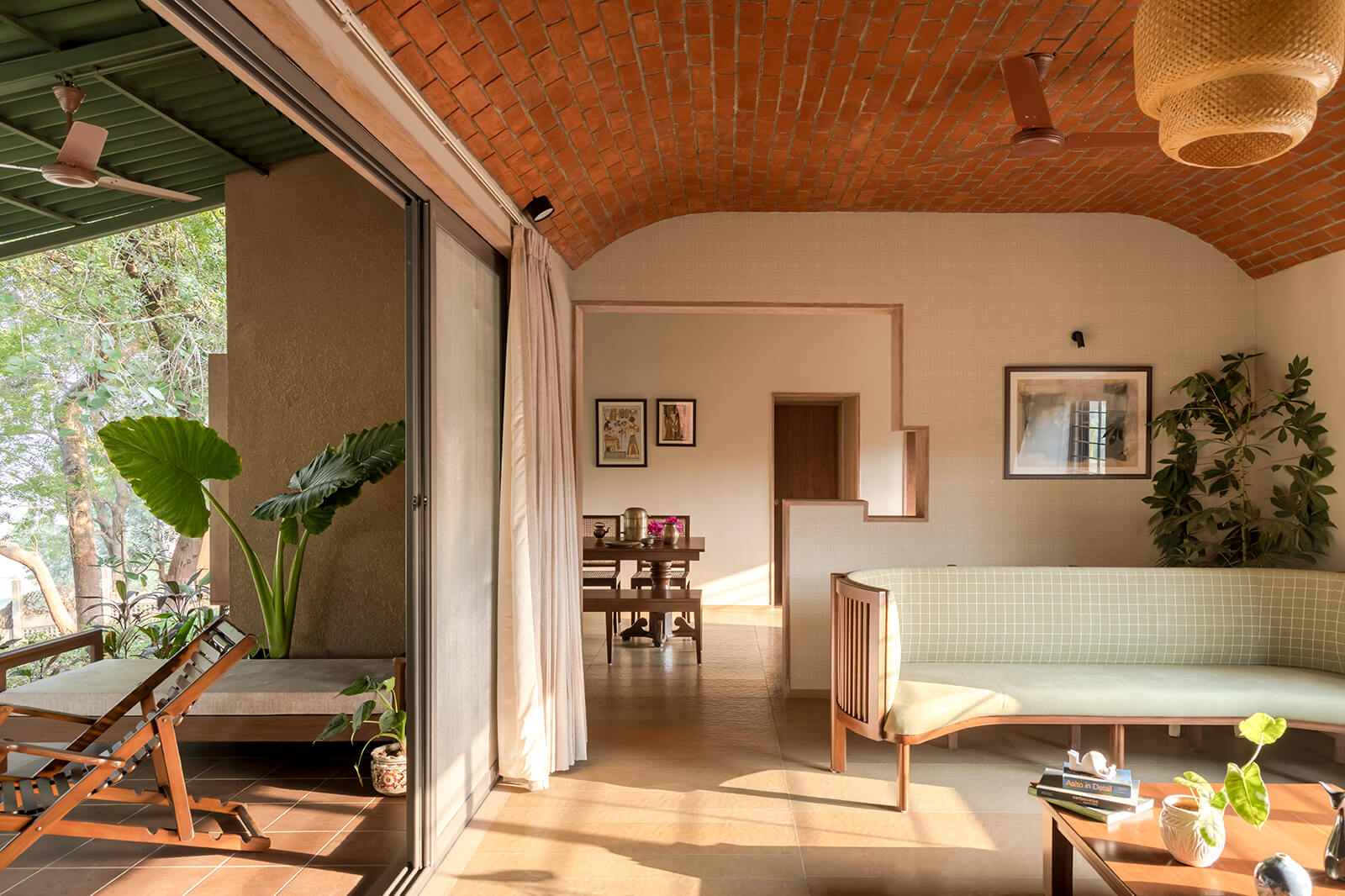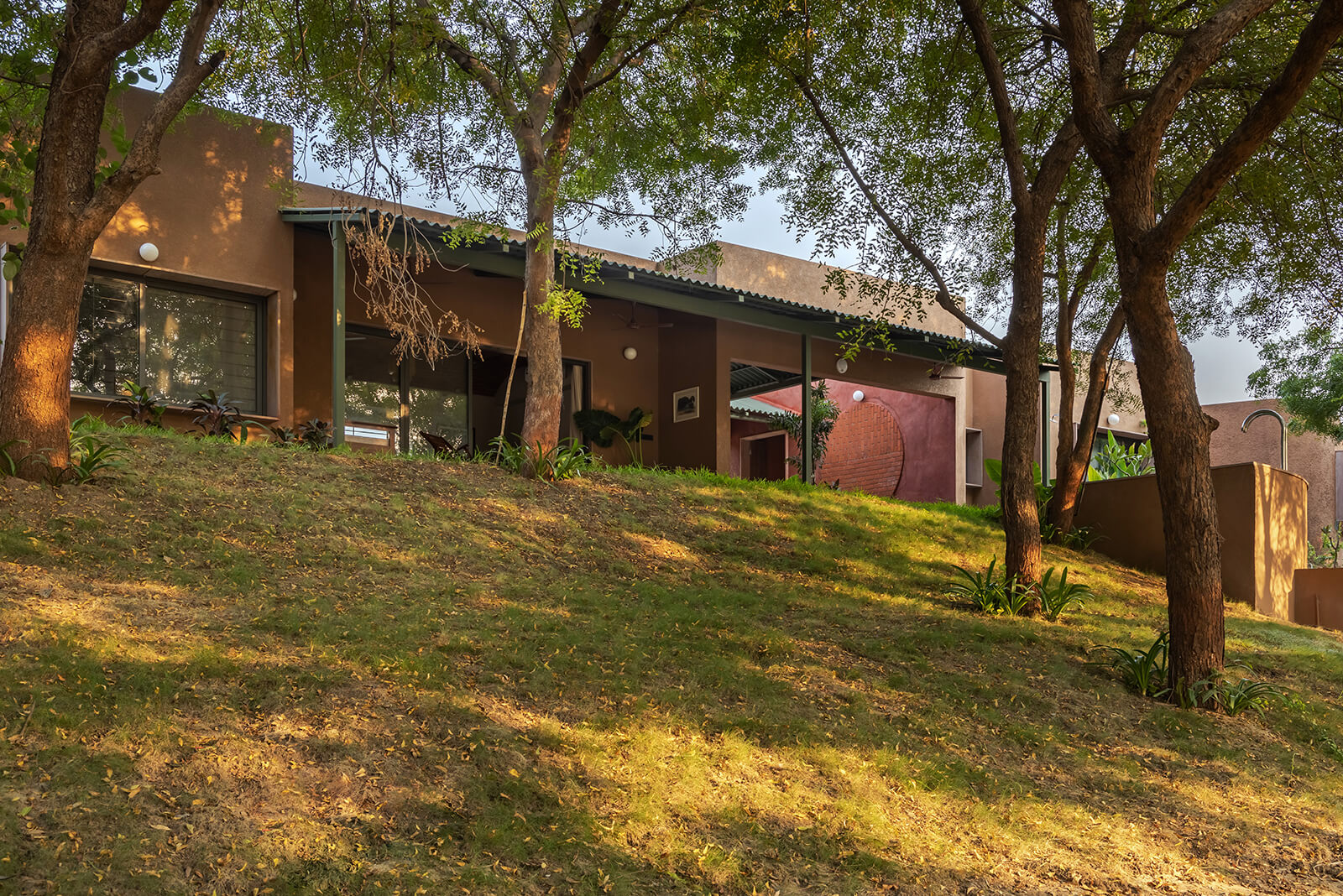Aagaram Architects' design for SITH Villa counters Vellore’s tropical climate
by Almas SadiqueJan 04, 2025
•make your fridays matter with a well-read weekend
by Almas SadiquePublished on : Jul 01, 2024
Deriving architectural inspiration from the context of a project’s site often means picking up distinct proximal styles and elements that can then be juxtaposed against the intended form of the structure. While integrating such attributes into one’s design helps enhance the concerted character of the said locality or zone, a vital detail missing from such compositions is the integration of and inspiration from the environment. In the face of scant natural spaces amid densely populated urban zones, the most requisite need and desire often boils down to the provision of ample private spaces that can serve as a sanctuary for its residents. Hence, the boxed-in residences that one typically witnesses in cities, emerge.
This thought process distinctly expands when one imagines, envisions and designs amid nature. As erstwhile English poet William Blake wrote, “To see a world in a grain of sand / And a heaven in a wild flower / Hold infinity in the palm of your hand / And eternity in an hour,” imaginations swell to encapsulate the universe in one’s thoughts, designs and dreams, when one’s vision is not blocked by the next multi-story tower, when the winds flow adrift and when the eyes can catch the sun sinking into the horizon.
Gujarat-based architecture practice, Studio DesignSeed, believes in appending these imaginations via their material visions. “Our thoughts and design are part of an ecosystem which belongs not above, but within nature. Our designs spur out of oneness, where each thought can correlate just like human beings in nature. Each thought could and should correlate in the right space and context which when executed through a thorough process results in something that 'breathes' - something that is alive,” shares Apeksha Ghia Ray, the principal architect of Studio DesignSeed. Referring to the name of the studio, the landscape architect adds, “Seed refers to the idea of a design or thought taking place, and germinating it, fostering it, letting that idea turn into a beautiful outcome. It's a process. The Seed is a metaphor.”
In their recent project, Courtyard House by the Water, the Indian architecture studio integrates this overarching vision in a residence design that occupies a delightful location amidst farmland and near a river. Infused with several verandahs and courtyards, the residence serves as a breathing pavilion that is well connected to its surroundings. “I see it more as a courtyard with a house. It was literally and metaphorically ‘A courtyard with a house’ rather than calling it a courtyard house—because the initial thought while designing it was how to create a home but still be outside, or rather—how to be outside under those abundant shade and cool breeze giving trees and the river, but still make it a house,” Ray shares, enunciating upon the structure's open plan. This desire to abundantly connect the inside with the outside resulted in the integration of ample outdoor semi-shaded areas and courtyards within the residential architecture.
The house is located in Vadodara (in Gujarat, India), in the vicinity (and in the midst) of farmland, with many different people growing their crops and irrigating their land with water from the Mahi River. Ergo, the river is considered a source of prosperity and a place for devotion by the locals. Inspired by its elevated rank amongst the locals, the Indian architect designed the residence such that it remains connected to the river. Sitting on a contoured site, Courtyard House by the Water overlooks the Mahi River—a tributary of the Arabian Sea—through the dense shade of neem and gulmohar trees located on the site. Further, the usage of river pebbles in certain parts of the house and husk from the local rice produce serve as material mediums that maintain a connection between the house and its surroundings.
Seated on farmland measuring 2,00,000 square feet, at the edge of the Mahi River, the private residence, owned by a couple who farm, features an array of plantations such as guava, castor oil, mango, teak, dragon fruit and more. The facade on the opposite side of the river faces these plantations.
While the initial plan was to construct a conventional space for farming activities and some sheltered space for residing, the design evolved to encapsulate a larger plan including two bedrooms and a pool. Speaking about her experience of working on the project, Ray shares, “The experience has been very overwhelming for a couple of reasons; the client’s initial brief of how he wanted the house to be evolved a lot, also through how we experienced the space while designing and through site visits over time. The construction was very challenging knowing that the site was remotely located, so everything had to be preplanned and organised. But when the project ended and the house finally came to use, we realised what it meant to be living outside!”
Even as the design evolved, the architects and clients ensured that the project would not take over the site overwhelmingly. The initial vision of maintaining the natural space in its original form was respected throughout the building process. This was ensured by keeping the building footprint minimal and puncturing the built mass with courtyards that could serve as passageways for natural light, ventilation and sheltered sanctuaries well connected to nature. Further, the architectural form was configured such that it could align along the river, creating a sense of cohesive axiality and directionality.
The entrance into the house, positioned through the facade facing away from the river, features a semi-shaded verandah connected to the indoor courtyard. This courtyard, with a special circular brick installation, is the focal point of the residence. The brick-lined circular feature on the wall remains visible from several points in the house. This centrally located courtyard extends, via large bay windows, to connect with the back verandah that overlooks trees on site and the river. This portion also houses the swimming pool, which was designed to take advantage of the 11-metre steep slope on-site. The infinity pool, positioned at eye level with the surrounding trees, presents an illusion of swimming amid a verdant scape. Hence, a continuous stretch of open breathing spaces extends through the central part of the residential building.
The courtyard design also divides the residence into two sections. While the northern end houses a living room, dining space and kitchen pantry, the southern end includes private areas such as bedrooms and bathrooms. The master bedroom, positioned at the end of the longitudinal structure, faces both the river and the farm, via large windows.

The visual aesthetic of the contemporary residence is raw and organic. This is ensured by experimenting with locally sourced materials and imbuing grounded colours in the residential interiors. “We believe in experimenting with materials, details and design which is not just sustainable but also a part of nature,” the studio shares. While river pebbles from the bank were employed to build the shower wall and the courtyard flooring, the arched ceiling was lined with brickwork. The master bathroom integrates green mosaics and reddish hues, the living room features Kota stone flooring and the courtyard’s walls are finished with a mix of plaster and rice husk. This demonstrates the studio’s innovative way of working with natural materials, whilst also creating a textured surface that complements the earthy colour palette. These warm tones, accompanied by the fabricated roofing in the outdoor spaces and the stone flooring, frame the outdoor views distinctly. Even the furniture and lamps within the residence are custom-designed by the architectural studio.
Since the residence is situated in a remote location, the electrical and plumbing facilities are designed straightforwardly and are maintenance-free. To handle the house’s drainage and sewage output, a dedicated soak pit and a septic tank have been installed on-site. The kitchen waste is dumped in a makeshift compost pit used for the garden and the surface run-off from the farmland flows towards the river.

The design of the load-bearing structure ensures its integration with the natural environment, hence preserving the landscape’s ecological integrity and beauty. The structure, with its earthen hues and slightly curved corners, sits in harmony with the proximate natural environment and the historical context of the site. The usage of local materials and aesthetics helps safeguard and enhance the region’s natural heritage. While the inner portions of the house are appropriately connected to the farm, some pockets in the structure are slightly disconnected from the outside. In these corners, green, brown and red hues help maintain a serene and nature-akin atmosphere indoors.
Name: Courtyard House by the Water
Location: Vadodara, Gujarat, India
Built Area: 2720 square feet
Year of completion: 2023
Architecture Studio: Studio DesignSeed
Lead Architect: Apeksha Ray
Design Team: Abhishek Vanparia, Simran Jandial, Sandhya Maurya
Contractor and Project Manager: Ray Construction Company
Plumbing Consultant: Krupalu Consultants
Electrical Consultant: Oriental Electricals
by Mrinmayee Bhoot Oct 14, 2025
The inaugural edition of the festival in Denmark, curated by Josephine Michau, CEO, CAFx, seeks to explore how the discipline can move away from incessantly extractivist practices.
by Mrinmayee Bhoot Oct 10, 2025
Earmarking the Biennale's culmination, STIR speaks to the team behind this year’s British Pavilion, notably a collaboration with Kenya, seeking to probe contentious colonial legacies.
by Sunena V Maju Oct 09, 2025
Under the artistic direction of Florencia Rodriguez, the sixth edition of the biennial reexamines the role of architecture in turbulent times, as both medium and metaphor.
by Jerry Elengical Oct 08, 2025
An exhibition about a demolished Metabolist icon examines how the relationship between design and lived experience can influence readings of present architectural fragments.
 surprise me!
surprise me!
make your fridays matter
SUBSCRIBEEnter your details to sign in
Don’t have an account?
Sign upOr you can sign in with
a single account for all
STIR platforms
All your bookmarks will be available across all your devices.
Stay STIRred
Already have an account?
Sign inOr you can sign up with
Tap on things that interests you.
Select the Conversation Category you would like to watch
Please enter your details and click submit.
Enter the 6-digit code sent at
Verification link sent to check your inbox or spam folder to complete sign up process



by Almas Sadique | Published on : Jul 01, 2024
What do you think?